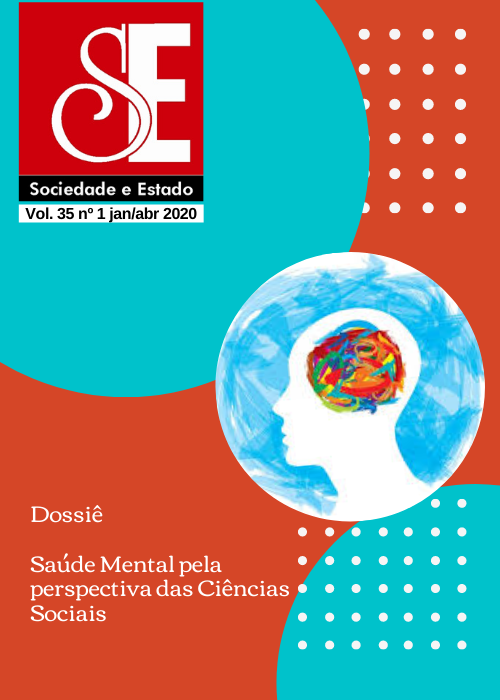For a post-colonial systemic sociology of the differences within the modern world society
DOI:
https://doi.org/10.1590/s0102-6992-202035010011Keywords:
modernity, Coloniality, World Society, Theory of systems, PostcolonialismAbstract
The approximations between the epistemological and ontological assumptions of Niklas Luhmann’s social theory and postcolonial approaches have been emphasized and developed in the last decade. In the context of postcolonial theories, the post-foundationalist point of view leads to the deconstruction of hegemonic and eurocentric discourses on modernity, operating a critical observation of cognitive and practical operations that build, in an essentialist register, national identities and cases based on self-(neo)colonialist understandings of the so-called central or developed countries. To the extent that Niklas Luhmann’s social theory starts from very similar ontological and epistemological assumptions, one might expect a deconstructive approach also in his theory of modern society, but until now prevails almost unanimously the perception that the Luhmannian conception of world society is incorrigibly eurocentric. Can this theory of world society not be eurocentric? Relying on more recent and less orthodox debates on this theory, it is argued in this communication that Luhmann’s theory of world society can be adopted in favor of criticism of the hegemonic and eurocentric discourse on modernity.
Downloads
References
ARALDI, Claudio; CORSI, Giancarlo; ESPOSITO, Elena. Glossar zu Niklas Luhmanns theorie sozialer systeme. Frankfurt a. M.: Suhrkamp, 1997. [ Links ]
BOATCÄ‚, Manuela; COSTA, Sérgio. Postkoloniale Soziologie: ein Programm. In: REUTER, Julia; VILLA, Paula-Irene (Orgs.). Postkoloniale Soziologie. Empirische Befunde, theoretische Anschlüsse, politische Intervention, p. 69-91. Bielefeld: Transcript, 2010. [ Links ]
BOMMES, Michael. Zur Bildung von Verteilungsordnungen in der funktional differenzierten Gesellschaft. Erläutert am Beispiel, ethnischer Ungleichheit’ von Arbeitsmigranten; In: SCHWINN, Thomas (Org.). Differenzierung und Soziale Ungleichheit. Die zwei Soziologien und ihre Verknüpfung. Frankfurt a. M: Humanities Online, 2004. [ Links ]
BRINGEL, Breno; DOMINGUES, José Maurício. Teoria social, extroversão e autonomia: impasses e horizontes da sociologia (semi)periférica contemporânea. Cad. CRH, v. 28, n. 73, p. 59-76, 2015. [ Links ]
BUTLER, Judith. Contingent foundations: feminisms and the question of ‘postmodernism’. In: BUTLER, Judith; WALLACH SCOT, Joan (Orgs.). Feminists theorize the political, p. 3-21. New York: Routledge, 1992. [ Links ]
CHAKRABARTY, Dispesh. Provicializing Europe: postcolonial thought and historical difference. Princeton (NJ): University of Princeton, 2000. [ Links ]
COSTA, Sérgio. Desprovincializando a sociologia - a contribuição pós-colonial. Revista Brasileira de Ciências Sociais, v. 21, n. 60, p. 117-134, 2006. [ Links ]
DOMINGUES, José Maurício. Latin America and contemporary modernity. A sociological interpretation. New York: Routledge, 2008. [ Links ]
DUTRA, Roberto. Diferenciação funcional e a sociologia da modernidade brasileira. Política e Sociedade, v. 15, n. 34, p. 77-109, 2016a. [ Links ]
_______. A universalidade da condição secular. Religião e sociedade, v. 36, n. 1, p. 151-174, 2016b. [ Links ]
_______. O problema da desigualdade social na teoria da sociedade de Niklas Luhmann. Cad. CRH, v. 27, n. 72, p. 547-561, 2014. [ Links ]
_______. Funktionale Differenzierung, soziale Ungleichheit und Exklusion. Konstanz: UVK, 2013. [ Links ]
ECKSTEIN, Lars; REINFANDT, Christoph. Luhmann in the Contact Zone: Zur Theorie einer transkulturellen Moderne. In: GRIZELJ, Mario; KIRSCHSTEIN, Daniela (Orgs.). Riskante Kontakte: Postkoloniale Theorien und Systemtheorie?, p. 107-124. Berlin: Kadmos, 2014. [ Links ]
EISENSTADT, Shmuel. N. Die Vielfalt der Moderne. Weilerswist: Velbrück Wissenschaft, 2000. [ Links ]
FERES JÚNIOR, João. Spanish America como o outro da América. Lua Nova, v. 26, n. 62, p. 69-91, 2004. [ Links ]
GARCIA DA COSTA, Everton. G.; RODRIGUES , Leo Peixoto. Teoria dos sistemas sociais, teoria do discurso e pós-fundacionismo: um diálogo possível. In: RODRIGUES, L. P.; NEVES, F. M. (Orgs.). Niklas Luhmann. Sistemas sociais: ensaios teóricos, p. 145-167. Porto Alegre: Editora Pontifícia Universidade Católica do Rio Grande do Sul, 2017. [ Links ]
GONÇALVES, Guilherme Leite. Functional differentiation as ideology of the (neo)colonial society. Thesis Eleven, v. 143, n. 1, p. 70-81, 2017. [ Links ]
_______. Pós-colonialismo e teoria dos sistemas: notas para uma agenda de pesquisa sobre o direito. In: DUTRA, Roberto; BACHUR, João Paulo (Orgs.). Dossiê Niklas Luhmann, p. 249-278. Belo Horizonte: Editora UFMG, 2013. [ Links ]
GRIZELJ, Mario; KIRSCHSTEIN, Daniela (Orgs.). Riskante Kontakte: Postkoloniale Theorien und Systemtheorie? Berlin: Kadmos, 2014. [ Links ]
HALL, Stuart. The West and the Rest: Discourse and Power. In: HALL, Stuart; GIEBEN, Bram (Orgs.). Formations of modernity, p. 275-320. Cambridge (UK): Polity Press; Open University, 1992. [ Links ]
HAHN, Alois. Identität und Nation in Europa. Berliner Journal für Soziologie, v. 3, p. 193-203, 1993. [ Links ]
HEINTZ, Bettina; WERRON, Tobias. Wie ist Globalisierung möglich? Zur Entstehung globaler Vergleichshorizonte am Beispiel von Wissenschaft und Sport. Kölner Zeitschrift für Soziologie und Sozialpsychologie, v. 63, p. 359-394, 2011. [ Links ]
HOLMES, Pablo. Verfassungsevolution in der Weltgesellschaft. Differenzierungsprobleme des Rechts und der Politik im Zeitalter der Global Governance. Baden-Baden: Nomos, 2013. [ Links ]
LUHMANN, Niklas. Zum Begriff der sozialen Klasse. In: LUHMANN, Niklas. Ideenevolution. Beiträge zur Wissenssoziologie, p.72-131. Frankfurt a. M.: Suhrkamp, 2008. [ Links ]
_______. Die Politik der Gesellschaft. KIESERLING, André (Org.). Frankfurt a. M: Suhrkamp, 2002. [ Links ]
_______. Die Gesellschaft der Gesellschaft. v. 1 e 2. Frankfurt a. M: Suhrkamp, 1997. [ Links ]
_______. Kausalität im Süden. Soziale Systeme, n. 1, 1995a. [ Links ]
_______. Jenseits von Barbarei. In: LUHMANN, Niklas. Gesellschaftsstruktur und Semantik 4 , p. 138-150. Frankfurt a. M.: Suhrkamp, 1995b. [ Links ]
_______. Symbiotische Mechanismen. In: LUHMANN, Niklas. Soziologische Aufklärung 3, p. 228-244. Opladen: Westdeutscher Verlag, 1981. [ Links ]
MASCAREÑO, Aldo. Die Moderne Lateinamerikas. Weltgesellschft, Region und funktionale Differenzierung. Bielefeld, transcript, 2012. [ Links ]
_______. Teoría de sistemas de América Latina. Conceptos fundamentales para la descripción de una diferenciación funcional concêntrica. Revista Persona y Sociedad, v. 17, n. 2, p. 9-26, 2003. [ Links ]
MIGLIEVICH-RIBEIRO, Adélia. Por uma razão decolonial: desafios ético-políticos-epistemológicos à cosmovisão moderna. Civitas - Revista de Ciências Sociais, v. 14, n. 1, p. 66-80, 2014. [ Links ]
MIGNOLO, Walter. Colonialidade: o lado mais escuro da modernidade. Revista Brasileira de Ciências Sociais, v. 32, n. 94, p. 1-18, 2017. [ Links ]
_______. The geopolitics of knowledge and the colonial difference. The South Atlantic Quarterly, v. 101, n. 1, p. 57-96, 2002. [ Links ]
NASSEHI, Armin. Kultur im System: einige programmatische Bemerkungen zu einer systemtheoretisch informierten Kultursoziologie. In: WOHLRAB-SAHR, Monika (Org.). Kultursoziologie: Paradigmen-Methoden-Fragstellungen, p. 375-395. Wiesbaden: VS Verlag, 2010. [ Links ]
NEVES, Fabrício M. A contextualização da verdade ou como a ciência torna-se periférica. Civitas - Revista de Ciências Sociais, v. 14, n. 3, p. 556-574, 2014. [ Links ]
_______. A diferenciação centro-periferia como estratégia teórica básica para observar a produção científica. Rev. Sociol. Polit., v. 17, n. 34, p. 241-252, 2009. [ Links ]
NEVES, Marcelo. Komplexitätssteigerung unter mangelhafter funktionaler Differenzierung. Das paradox der sozialen Entwicklung Lateinamerikas. In: BIRLE, Peter et alii (Orgs.). Durch Luhmanns Brille. Herausforderungen an Politik und an Recht in Latein Amerika und in der Weltgesellschaft. Wiesbaden: Springer; VS Verlag, 2012. [ Links ]
_______. Die Staaten im Zentrum und die Saaten an der Peripherie. Einige probleme mit Niklas Luhmanns Auffassung von den Staaten der Weltgesellschaft. Soziale Systeme, v. 12, p. 247-273, 2006. [ Links ]
_______. Verfassung und Positivität des Rechts in der peripheren Moderne: eine theoretische Betrachtung und eine Interpretation des Falls Brasiliens. Berlin: Duncker und Humblot, 1992. [ Links ]
PARSONS, Talcott. The system of modern societies. Englewood Cliffs (NJ): Prentice-Hall Inc., 1971. [ Links ]
QUIJANO, Aníbal. Colonialidad del poder, cultura y conocimiento en América Latina. Anuario Mariateguiano, v. 101, n. 1, p. 113-122, 1997. [ Links ]
QUIJANO, Aníbal; WALLERSTEIN, Immanuel. Americanity as a concept, or the Americas in the modern world-system. International Social Science Journal, v. 44, n. 4, p. 549 - 557, 1992. [ Links ]
DE GIORGI, Raffaele. Periferias da modernidade. Revista Direito Makenzie, v. 11, n. 2, p. 39-47, 2017. [ Links ]
RAMOS, Alberto Guerreiro. A modernização em nova perspectiva: em busca do modelo da possibilidade. Revista de Administração Pública, v. 17, n. 1, p. 6-51, 1983. [ Links ]
RANDERIA, Shalini. Jenseits von Soziologie und soziokultureller Anthropologie: Zur Ortbestimmung der nichtwestlichen Welt in einer zukünftigen Sozialtheorie. In: BECK, Ulrich; KIESERLING, Andre (Orgs.). Ortsbestimmung der Soziologie: Wie die kommenden Generation Gesellschaftswissenschaften betreiben will, p. 41-50. Baden-Baden, Nomos, 2000. [ Links ]
RUGGERO, Santiago. América Latina y la colonialidad. Un abordaje sistémico de las teorías poscoloniales para una teoría pós-colonial. XXVII Congreso de la Asociación Latinoamericana de Sociología. VIII Jornadas de Sociología de la Universidad de Buenos Aires. Asociación Latinoamericana de Sociología, Buenos Aires, 2009. Disponível em: <http://cdsa.aacademica.org/000-062/1211.pdf>. Acessado em: 20 Mar. 2018. [ Links ]
SAID, Edward. Orientalismo. O Oriente como invenção do Ocidente. São Paulo: Companhia das Letras, 2007. [ Links ]
SCHMIDT, Volker. Conceptualizing global modernity. A tentative sketch. Working paper series, National University of Singapore, 2012. [ Links ]
SOUZA, Jessé. Niklas Luhmann, Marcelo Neves e o “culturalismo cibernético” da moderna teoria sistêmica. In: DUTRA, Roberto; BACHUR, João Paulo (Orgs.). Dossiê Niklas Luhmann, p. 149-182. Belo Horizonte: Editora UFMG, 2013. [ Links ]
_______. Jenseits von Zentrum und Peripherie. Über die symbolische Dimension des Kapitalismus. Berliner Journal für Soziologie, v. 21, n. 1, p. 23-38, 2011. [ Links ]
STÄHELI, Urs. Die Konstruktion des Finanzpublikums: eine genealogische Analyse. In: STICHWEH, Rudolf; WINDOLF, Paul (Orgs.). Inklusion und Exklusion: Analysen zur Sozialstruktur und sozialen Ungleichheit, p. 259-272. Wiesbaden: VS Verlag, 2009. [ Links ]
TAVOLARO, Sérgio B. F. A tese da singularidade brasileira revisitada: desafios teóricos contemporâneos. Dados, v. 57, n. 3, p. 633-673, 2014. [ Links ]
UNGER, Roberto Mangabeira. O que a esquerda deve propor. Rio de Janeiro: Civilização Brasileira, 2008. [ Links ]
_______. False necessity: anti-necessitarian social theory in the service of radical democracy. New York: Verso, 2004. [ Links ]
WEIß, Anja. Soziologie globaler Ungleichheiten. Frankfurt a. M.: Suhrkamp, 2017. [ Links ]
_______. Raumrelationen als zentraler Aspekt weltweiter Ungleichheiten. Mittelweg, v. 2, p. 76-91, 2002. [ Links ]
WERRON, Tobias. Publika. Zur Globalisierungsdynbamik von Funktionssystemen. Soziale Systeme, v. 13, p. 386-388, 2007. [ Links ]




.jpg)



















